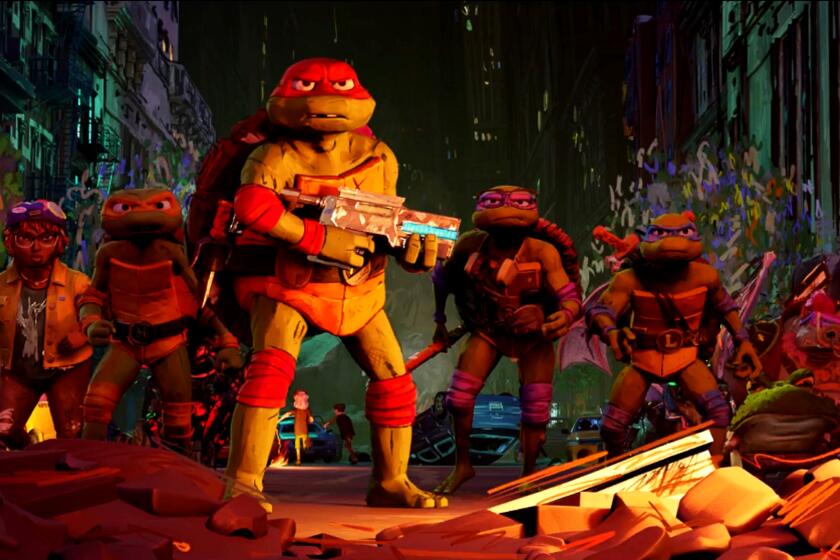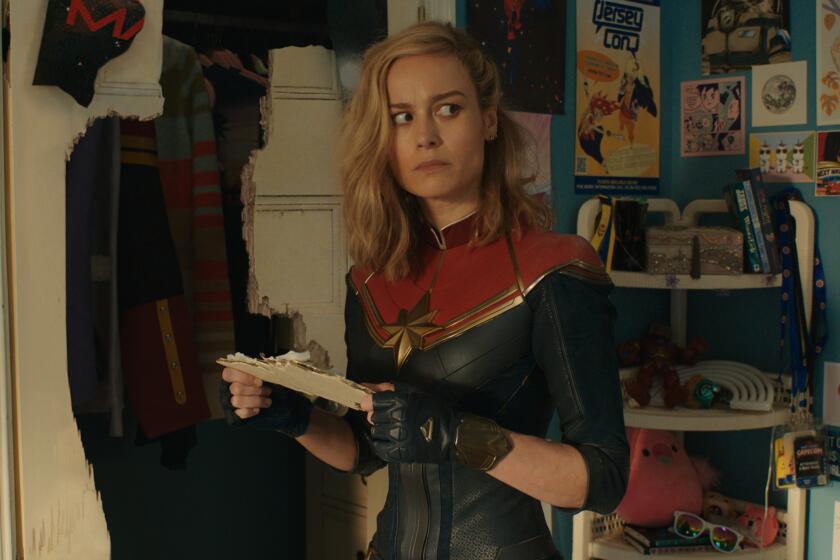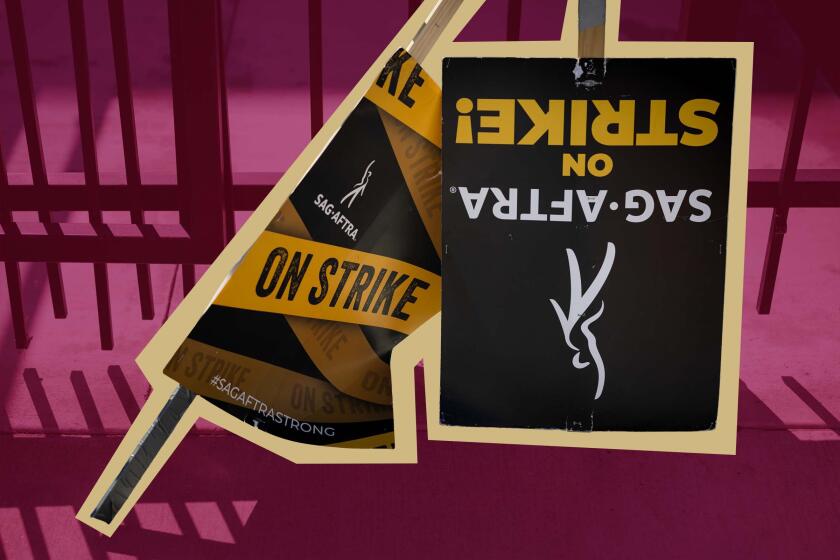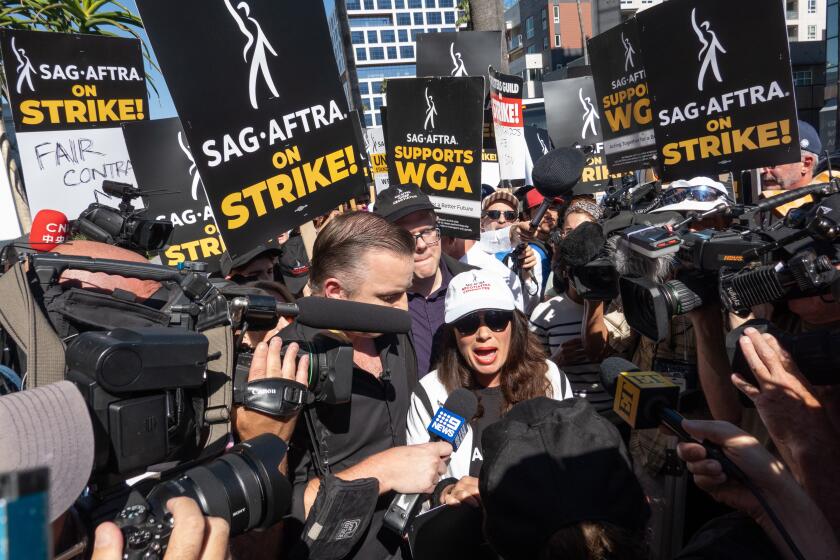Box office 2023: Buoyed by ‘Barbenheimer,’ hobbled by strikes and franchise flops
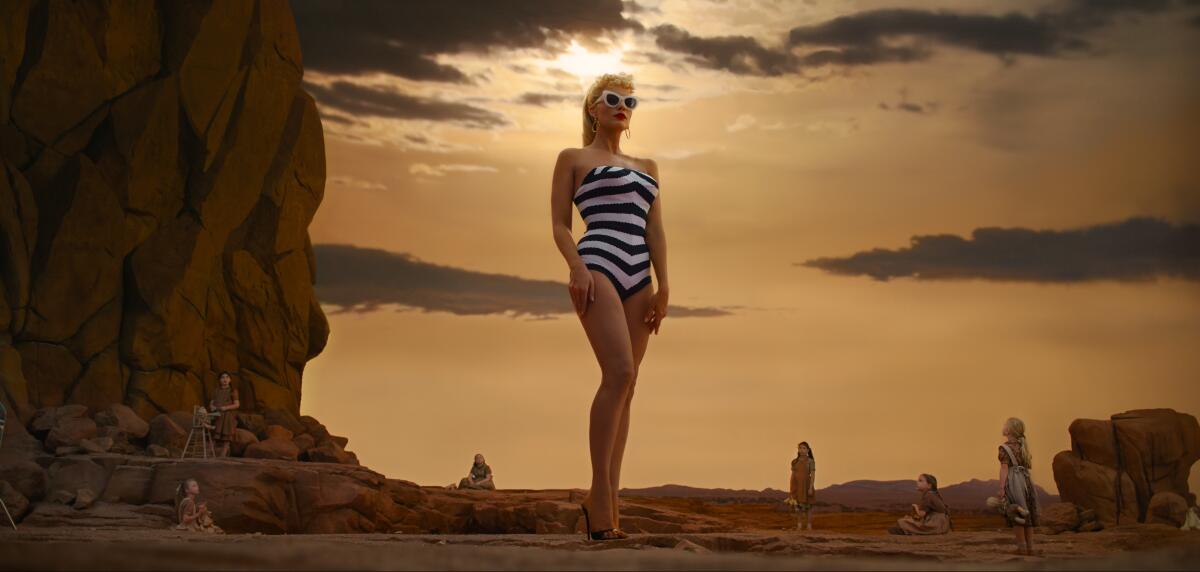
- Share via
During a theatrical decade best defined by its franchises and interconnected superhero epics, 2023 offered some hope for (semi-)original filmmaking — and was the year that “Barbenheimer” entered the lexicon.
But enthusiasm for the ongoing box office rebound was dampened by dual strikes in Hollywood that delayed a handful of high-profile movies and hobbled studios’ promotional efforts, delivering a blow to overall sales.
Thanks in part to strong showings over the summer (hi, Barbie!), the domestic box office continued its gradual recovery from the COVID-19 pandemic. Ticket sales in the U.S. and Canada are expected to near $9 billion for 2023, according to studio and analyst estimates. Year-end totals are estimated to be up 22% from total sales in 2022.
Inside the business of entertainment
The Wide Shot brings you news, analysis and insights on everything from streaming wars to production — and what it all means for the future.
You may occasionally receive promotional content from the Los Angeles Times.
However, revenue remains down 21% from the levels reached in the pre-pandemic year of 2019.
Yes, several megabudget franchise installments faltered, including “Indiana Jones and the Dial of Destiny,” “The Flash” and “The Marvels.” But much of the broader revenue shortfall is explained by a lower total number of major theatrical movies compared to 2019, when studios put out 105 films in wide release, according to Comscore. This year’s total of 86 wide releases is down about 18% from 2019.
The viral social media phenomenon, inspired by the same-day release of ‘Barbie’ and ‘Oppenheimer,’ is the best advertising campaign for moviegoing that no studio could’ve come up with.
Multiple planned 2023 releases (Warner Bros.’ “Dune: Part Two,” MGM’s “Challengers,” Sony Pictures’ “Kraven the Hunter” and the next “Ghostbusters” entry) were delayed as writers and actors hit the picket lines in pursuit of increased pay, benefits and job protections. And movies that did open during the actors’ strike, such as “Teenage Mutant Ninja Turtles: Mutant Mayhem” and “Saw X,” had to do so without their stars promoting them.
That’s been a challenge for theaters still struggling to get butts in seats consistently, particularly after the pandemic.
“There’s no surprise and getting around the fact that the industry was really recovering and moving out of the pandemic,” said Jeff Goldstein, head of domestic distribution at Warner Bros. “There were definitely some issues that were residual from the pandemic like the delays in production, and you were seeing the tail end of that. ... When you add in two strikes happening, that made it even more complex and compounded the issues.”
But the year still gave the film industry some reasons for optimism. Compared to 2022, which had just 67 releases, the box office was boosted by the return of multiple franchise entries and, most notably, a social-media-driven phenomenon or two that drew viewers to theaters in droves.
Paramount Pictures is leaning into franchises like ‘Teenage Mutant Ninja Turtles’ and ‘Paw Patrol,’ which have generated $2.5 billion in retail sales this year and done solid business at the box office.
Greta Gerwig’s “Barbie” was the theatrical standout of the year, bringing in $1.4 billion at the global box office, including $636 million in the U.S. and Canada, and becoming the biggest global release in the 100-year history of Warner Bros.
“It was an extraordinary pink fever year,” Goldstein said. “What we realized is when there are movies that audiences want to see, they come out in a big way. They love going to movie theaters, they love the shared experience. It becomes an event for them to leave their homes, and I think that’s really exciting to see.”
‘The Marvels’ fell out of the top 10 at the box office after three weekends. The studio has been struggling with quality control, according to some.
Starring Margot Robbie as the Mattel doll and featuring self-aware humor, emotion and social commentary, “Barbie” served as one-half of this summer’s Barbenheimer phenomenon, which drew hordes of moviegoers to the theaters for a double feature with the unlikeliest of pairings: the dark atomic bomb drama “Oppenheimer,” from director Christopher Nolan, which ranked No. 5 domestically with $326 million in the U.S. and Canada ($951 million worldwide).
In total, half of the top 10 domestic releases this year — Warner Bros.’ “Barbie” (No. 1), Universal’s “The Super Mario Bros. Movie” (No. 2), Universal’s “Oppenheimer” (No. 5), Angel Studios’ “Sound of Freedom” (No. 9) and AMC Theatres’ “Taylor Swift: The Eras Tour” (No. 10) — were not sequels or extensions of existing film franchises. That’s a marked departure from last year, when every title in the top 10 was a sequel, reboot or part of a larger cinematic universe. (Barbie and Super Mario are, of course, well-established intellectual property.)
“I don’t remember the last time the top five wasn’t dominated by sequels,” said Eric Handler, media and entertainment analyst at Roth MKM. “It’s good to see some new franchise or original IP register well with moviegoers.”
And sure, corporate-backed tentpoles featuring hugely popular characters and a concert movie starring arguably the most famous musician on the planet aren’t exactly indie darlings. But those blockbusters — plus two deeply serious, adult-facing dramas in “Oppenheimer” and “Sound of Freedom” — beating the latest installments in the “Indiana Jones,” “Mission: Impossible,” “Transformers” and “Fast & Furious” franchises?
“Are you kidding me?” said Jeff Bock, senior box office analyst at Exhibitor Relations Co. “Nobody would have predicted that.”
With the rise of Barbie, Mario and Oppenheimer came the remarkable stumble of the superhero tentpole, long the film industry’s most bankable big-budget genre.
People shelled out for concert tickets, flocked to sports games, and emptied their wallets for vacations to Disneyland. Here’s why ‘fun-flation’ became a 2023 economic buzzword.
Several superhero movies cracked the top 10: Sony’s “Spider-Man: Across the Spider-Verse” (No. 3), Disney’s “Guardians of the Galaxy Vol. 3” (No. 4) and “Ant-Man and the Wasp: Quantumania” (No. 7). But “Shazam! Fury of the Gods,” “The Flash,” “Blue Beetle” and “The Marvels” flopped, with the last title becoming the lowest-grossing film in the Marvel Cinematic Universe with a meager $84 million domestically.
The misses from Marvel Studios and Warner Bros.’ DC universe come at a time when studios across the industry contend with audience fatigue and the overextension of franchises. Even Disney Chief Executive Bob Iger has openly acknowledged the loss of quality in Marvel’s recent projects, which have increasingly grown complicated and interwoven across film and TV. Disney’s all-important animated studios have also lost some of their luster, with “Wish” bombing and “Elemental” posting so-so numbers for a Pixar film.
The film and TV industry’s IP bubble is not popping any time soon. But the industry is finding franchises in new places.
Still, the toughest challenge for exhibitors in 2023 was the combined Hollywood strikes, said Elizabeth Frank, head of worldwide programming and chief content officer for AMC Theatres, the world’s largest cinema operator.
“Many in Hollywood are scrambling to get things back on track, but it’s tough,” Frank said. “It’s a lot of work to … resume that continuous process.”
A review of the details governing AI in SAG-AFTRA’s new contract. Plus, the latest disappointment for Marvel Studios and its 33-film cinematic universe.
The effects of the work stoppages will surely linger into next year. The 2024 slate is expected to be lighter than usual, with highly anticipated movies such as “Mission: Impossible — Dead Reckoning Part Two” and “Spider-Man: Beyond the Spider-Verse” pushed until 2025 or beyond.
But executives at some studios see a possible silver lining. Those reductions may ultimately work out in favor of some of the smaller distributors, whose major 2024 releases may have less competition.
SAG-AFTRA is no longer going to approve interim agreements on productions that have a contract with the Writers Guild of America.
Lionsgate saw the benefit of less competition this year with “Hunger Games: The Ballad of Songbirds and Snakes.” In October, the studio received a last-minute agreement with SAG-AFTRA to allow the stars of its “Hunger Games” prequel, including Rachel Zegler and Tom Blyth, to promote the film, which had a solid opening and is expected to cross $300 million worldwide.
“You need good films for the audience to come — an absence of other films won’t do it in and of itself,” said Adam Fogelson, vice chairman of the Lionsgate Motion Picture Group. But “we feel really good about what we have on tap [in 2024]. And not unlike what just happened with ‘Hunger Games,’ a little bit less of an overall competitive environment can only help good films that the audience decided they want to see.”
More to Read
Inside the business of entertainment
The Wide Shot brings you news, analysis and insights on everything from streaming wars to production — and what it all means for the future.
You may occasionally receive promotional content from the Los Angeles Times.

